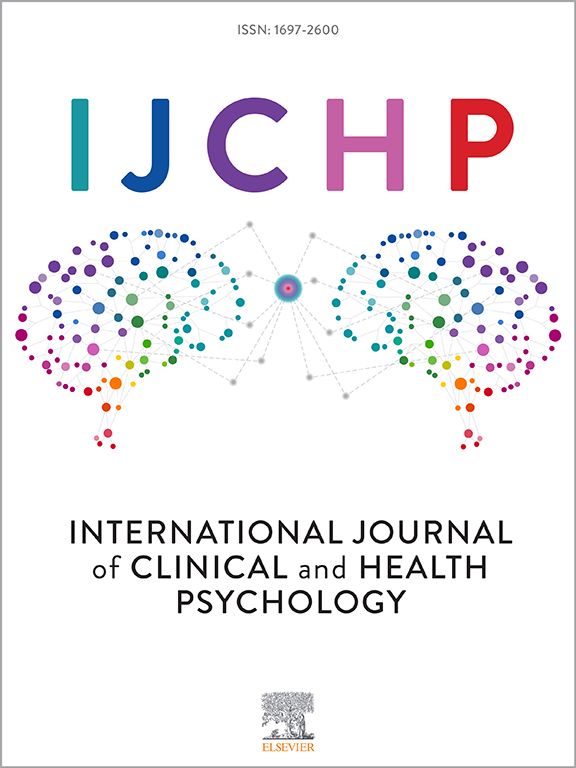Factors affecting treatment adherence among patients with hypertension based on the PRECEDE model: A cross-sectional study from a delay discounting perspective
IF 4.4
1区 心理学
Q1 PSYCHOLOGY, CLINICAL
International Journal of Clinical and Health Psychology
Pub Date : 2025-01-01
DOI:10.1016/j.ijchp.2025.100553
引用次数: 0
Abstract
Background
Hypertension is a significant global public health concern, and research shows that treatment adherence plays an important role in hypertension control. This study incorporated a novel factor in behavioral economics, delay discounting, into the predisposing factors within the PRECEDE model to explore the factors influencing adherence to treatment of patients with hypertension.
Design
This cross-sectional study was conducted in Jiangsu Province, China, in 2023 and included 1,123 patients with hypertension.
Methods
Data collection tools included demographic variables and predisposing, reinforcing, and enabling factors. Delay discounting was assessed using a self-designed computer program. The collected data were analyzed using descriptive statistics and hierarchical regression. This study used the STROBE Reporting Checklist.
Results
The variables accounted for 30.4% of the total variance in adherence to treatment of patients with hypertension. Hierarchical regression analyses revealed that the predisposing (knowledge, delay discounting, and self-efficacy), reinforcing, and enabling factors were significantly associated with treatment adherence.
Conclusions
Delay discounting was associated with hypertension treatment adherence. Enhancing the predisposing, enabling, and reinforcing factors may lead to increased adherence among patients with hypertension. It is recommended that hospitals and healthcare providers offer educational lectures and training sessions, and that some simple delayed discount interventions be added to supplement this. Additionally, government and institutional efforts should be made to increase the availability of community-level resources for patients with hypertension.
基于pre模型的高血压患者治疗依从性影响因素:延迟折扣视角的横断面研究
高血压是一个重要的全球公共卫生问题,研究表明治疗依从性在高血压控制中起着重要作用。本研究将行为经济学中的一个新因素——延迟折扣纳入到pre模型的易感因素中,以探讨影响高血压患者治疗依从性的因素。本横断面研究于2023年在中国江苏省进行,纳入1123例高血压患者。方法数据收集工具包括人口统计学变量和诱发因素、强化因素和使能因素。使用自行设计的计算机程序评估延迟折扣。对收集的数据进行描述性统计和层次回归分析。本研究采用了STROBE报告清单。结果这些变量占高血压患者治疗依从性总方差的30.4%。分层回归分析显示,易感因素(知识、延迟折扣和自我效能)、强化因素和使能因素与治疗依从性显著相关。结论延迟折扣与高血压治疗依从性相关。增强诱发因素、使能因素和强化因素可能导致高血压患者依从性增加。建议医院和医疗保健提供者提供教育讲座和培训课程,并增加一些简单的延迟折扣干预措施作为补充。此外,政府和机构应努力为高血压患者提供更多的社区资源。
本文章由计算机程序翻译,如有差异,请以英文原文为准。
求助全文
约1分钟内获得全文
求助全文
来源期刊

International Journal of Clinical and Health Psychology
PSYCHOLOGY, CLINICAL-
CiteScore
10.70
自引率
5.70%
发文量
38
审稿时长
33 days
期刊介绍:
The International Journal of Clinical and Health Psychology is dedicated to publishing manuscripts with a strong emphasis on both basic and applied research, encompassing experimental, clinical, and theoretical contributions that advance the fields of Clinical and Health Psychology. With a focus on four core domains—clinical psychology and psychotherapy, psychopathology, health psychology, and clinical neurosciences—the IJCHP seeks to provide a comprehensive platform for scholarly discourse and innovation. The journal accepts Original Articles (empirical studies) and Review Articles. Manuscripts submitted to IJCHP should be original and not previously published or under consideration elsewhere. All signing authors must unanimously agree on the submitted version of the manuscript. By submitting their work, authors agree to transfer their copyrights to the Journal for the duration of the editorial process.
 求助内容:
求助内容: 应助结果提醒方式:
应助结果提醒方式:


